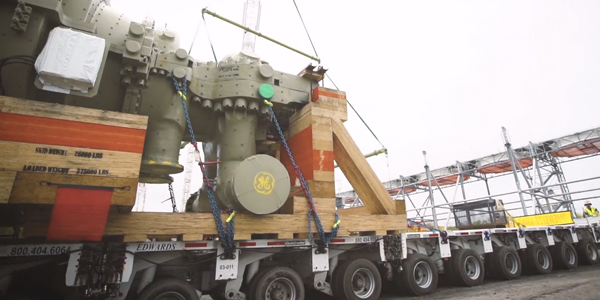By Michael Kuser
FERC on Friday accepted an unexecuted large generator interconnection agreement (LGIA) filed by ISO-NE and National Grid for Clear River Energy’s 1,100-MW natural gas-fired plant in Burrillville, R.I. (EL18-349).
The commission’s Jan. 26 order rejected Clear River’s protests over the dates for providing financial security for the cost of required transmission upgrades; its request to self-build certain interconnection facilities; its cost responsibility for transmission upgrades; and its request for additional data backing the cost allocation.
Clear River’s twin one-by-one combined cycle generating units will interconnect with the grid at National Grid’s existing Sherman Road 345-kV switching station through a new 345-kV generator lead line. During LGIA negotiations, Clear River requested to push back the initial commercial operation date two years, to May 31, 2021. National Grid confirmed that it could meet the new deadlines.
Clear River complained that the unexecuted agreement would require it to begin spending up to $88 million prior to the project’s permits being secured.
The commission ruled that the milestones developed by National Grid were based on the schedule proposed by Clear River. “Clear River’s request to adjust the dates by which it must issue its notices to proceed and post security appears to be due to permitting delays. We note that, if Clear River prefers to proceed once it receives the required permits, then it is free to propose later key milestone dates. National Grid has stated that it will re-evaluate the other milestones should Clear River avail itself of this option.”
The commission also rejected Clear River’s request to self-build its interconnection facilities, saying that option is only available if National Grid is unable to meet Clear River’s milestone dates.
FERC also found that ISO-NE had provided all the information it is required to in justifying Clear River’s $44 million in transmission upgrades.
It also rejected Clear River’s request to restudy its cost obligation because of the two-year delay in its proposed commercial operational date. The company said some upgrades in its LGIA will not be necessary because of several transmission projects expected to be online by 2021 in the Southeast Massachusetts/Rhode Island area: the New Grand Army switching station; upgrades to the Somerset Substation; and upgrades to transmission lines X3 and W4.
FERC said Clear River’s decision to delay its commercial operating date was not grounds for triggering a restudy under ISO-NE’s Tariff.
In November, Clear River had filed a separate complaint asking FERC to eliminate provisions in the RTO’s pro forma LGIA that permit the direct assignment to interconnection customers of network upgrade-related operations and maintenance costs (EL18-31). On Jan. 23, however, the company filed to withdraw the complaint.
“Clear River believes it has shown that, given the nature of the relevant upgrades (which consist almost entirely of replacing or relocating existing network facilities), there very likely would be no monetary impact on Rhode Island ratepayers whatsoever. Nevertheless, the relief sought by Clear River has proven contentious in the Rhode Island Energy Facility Siting Board (EFSB) proceeding regarding Clear River’s application for the permits necessary for the project to be constructed,” the company said. “Accordingly, in order to remove this issue from being considered in any way in the EFSB proceeding — and to eliminate even the false perception of negative ratepayer impact — Clear River is submitting this notice of withdrawal.”
FERC’s Jan. 26 order noted that the notice of withdrawal remains pending. “The commission’s determination in this case should not be read as prejudging the resolution of any substantive issue in that proceeding,” it said.




